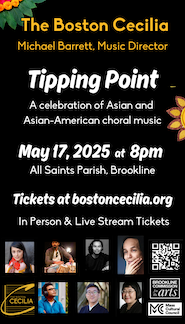Nelsons, BSO unlock Shostakovich’s Sixth amid Stravinsky and a world premiere

Andris Nelsons conducted the Boston Symphony Orchestra in music of Shostakovich, Stravinsky, and Aleksandra Vrebalov Saturday night. Photo: Winslow Townson
Beware of ideas, Joseph Stalin once warned: they are more powerful than guns. “We would not let our enemies have guns,” he went on. “Why should we let them have ideas?”
That statement might make a good subheading for the Boston Symphony Orchestra’s “Decoding Shostakovich” festival, which has been demonstrating the veracity—and limitations—of the sentiment all month long. On Saturday night, the ensemble and Andris Nelsons unveiled the series’ penultimate program, one that offered more religious twists than usual.
Though he had his run-ins with the regime, Dmitri Shostakovich was at least a dutiful Soviet citizen when it came to his atheism. Once asked if he believed in God, the composer responded in the negative—before allegedly adding that he was very sorry not to.
Igor Stravinsky didn’t harbor such regrets. Born a generation earlier, he was a son of the Russian Orthodox Church and the Symphony of Psalms, commissioned by the BSO in 1930, is as much a personal statement of faith as it is a brilliant distillation of his neo-Classical style.
It’s also a work for which Nelsons has a special affinity. Though Saturday marked the first time the BSO’s music director has conducted the score at Symphony Hall, he’s led it twice before at Tanglewood and made an excellent recording of it early in his career in Birmingham.
This weekend’s account was plusher than that recording, especially during the big moments over Psalms’ latter two-thirds. In those, the orchestra tended to smother the contributions of the Tanglewood Festival Chorus and the reading threatened to turn inward on itself.
But it avoided the last. Instead, the BSO’s playing—which was, often enough, a model of warmth and well-blended sonority—leaned into the music’s absorbing plays of color as well as its sometimes-stark fluctuations of character.
Though sounding a bit stout, the first movement’s ostinatos drove energetically. Meantime, the second’s opening fugue was marked by a focused, searching urgency. Similarly, the finale’s “Alleluia” refrains unfolded with hazy, dreamlike devotion; the last chord was flawlessly balanced.
The James Burton-prepared TFC sang with tonal warmth and good diction. They brought vigor to bear on their various “laudate” injunctions in the last section, as well as weight and bite to the first- and second-movement pleas for remembrance and forgiveness.
There weren’t explicit appeals of the latter sort to be found in Aleksandra Vrebalov’s Love Canticles, a BSO-commissioned response to the Symphony of Psalms that received its world premiere on Saturday night. Instead, the Serbian native’s setting of parts of Psalms 103 and 104 invoked commands to praise—though the composer’s pre-performance comments indicated that she is less interested in extolling a deity than in celebrating humanity, nature, and music.
Be that as it may, Vrebalov’s crafted a potent realization of her chosen texts. The score is clearly structured and its deployment of aleatoric gestures cogent. Though often homophonic, the choral writing breaks into counterpoint at strategic moments. While her instrumentation is the same as Stravinsky’s, Love Canticles sounds nothing like it.
It isn’t without its hiccups, though: the big orchestral climax seems randomly placed. What’s more, a sudden turn to diatonicism near the middle comes out of the blue and the work’s marriage of plainchant allusions with queasy chromaticism isn’t quite seamless.
Nevertheless, Love Canticles, which Nelsons, the TFC, and BSO delivered with stylistic verve on Saturday, manages to capture the nervous tension undergirding the relationship between a finite creature and an infinite divinity. There is, throughout, a sense of wonder in its floating vocal lines, as well as invention in its unpredictable instrumental turns.
At the same time, an ominous edge prevails: “we are dust,” the libretto reminds, our “days like grass.” The Canticles’ unease is palpable—and for good reason.
Shostakovich’s Symphony No. 6 is marked by a similar volatility. Completed in 1939, the effort coincided with the composer’s return to official favor following the premiere of his Fifth Symphony as well as the culmination of Stalin’s Great Purge, which saw the murders of several of his close friends and artistic associates.
Given that context, the Sixth is, unsurprisingly, the strangest of Shostakovich’s mature symphonies. Its first movement is long, brooding, and marked by extreme shifts of texture and mood. The two movements that follow are brash, circus-like affairs that have seemingly little to do with what came before. However, as Saturday’s illuminating reading made clear, the work’s polar opposites are, in fact, closely related.
In the opening Largo, Nelsons highlighted the bold alternations between the music’s lush, noble statements and its desolate, spare ones. The severity and suddenness of these transformations was the point; expressively, the portrait he and the BSO painted—especially across the movement’s hushed spots and via the ensemble’s haunting woodwind solos—was deeply unsettling.
More of the same emerged in the Allegro which, for all the lightness and charm of its opening, was anything but a sunny respite. Rather, the shattered aftermath of its violent, mechanistic climax read, rightly, like the first movement’s dispiriting sequel.
Yet this section awakens a greater awareness in the music: when a similar gesture portends in the finale, it runs straight into a buzz saw of irony and humor—and crumbles in the face of it. Here, Nelsons and the orchestra prefaced the end result with an unexpectedly lilting take on the Presto’s jaunty opening theme.
When its reprise, saucy and exuberant as ever, rolled around, the effect was thrilling and purgative. Among other things, it was a reminder that Stalin was only partly right. Ideas are powerful things. But you suppress them at your peril: just like the human spirit, they’ll eventually find a way to break free.
The program will be repeated 2 p.m. Sunday at Symphony Hall. bso.org
Posted in Performances
